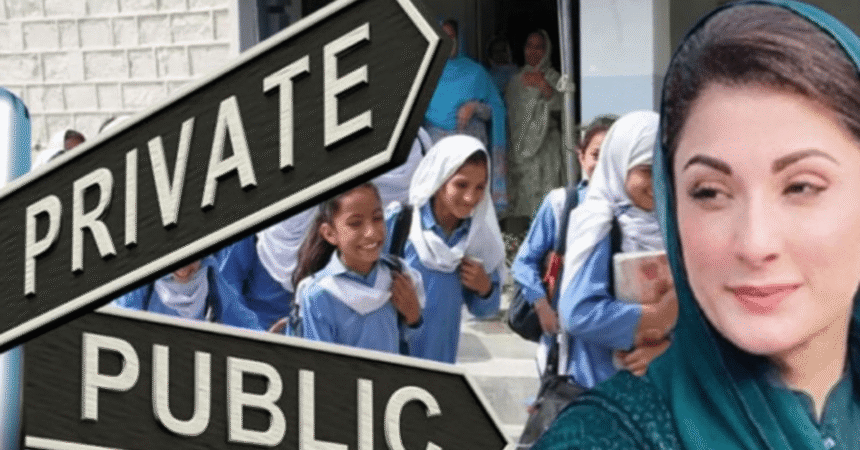Introduction
The Punjab government has recently announced a significant educational reform initiative that involves outsourcing approximately 6,000 government schools across the province. This decision, articulated by Chief Minister Maryam Nawaz Sharif during a ceremony in Lahore, has sparked widespread discussion regarding its potential implications for the education sector in Pakistan. As the largest province in the country, Punjab’s educational challenges are considerable, and this move is seen as a step towards addressing long-standing issues that hinder the development of a robust educational framework.
In this detailed analysis, we will explore the reasons behind the government’s decision to outsource schools, the anticipated benefits, the challenges that may arise, and the broader implications for the education system in Punjab.
The Rationale Behind Outsourcing Schools
Current Challenges in the Education Sector
The educational landscape in Punjab has faced numerous challenges over the years, including inadequate infrastructure, teacher shortages, and poor learning outcomes. Many schools operate with outdated resources, and a significant percentage of students do not achieve basic literacy and numeracy skills. Additionally, the lack of accountability and effective management has exacerbated these problems, leading to a growing discontent among parents and stakeholders.
- Infrastructure Issues: Many government schools are in a dilapidated state, lacking basic facilities such as clean water, sanitation, and proper classrooms. This environment hampers the learning experience and contributes to high dropout rates.
- Quality of Education: The quality of education varies widely across different regions, with rural schools often performing significantly worse than their urban counterparts. This disparity has resulted in unequal opportunities for students.
- Teacher Shortage: There is a chronic shortage of trained and qualified teachers in many schools. The existing workforce often lacks the necessary skills and training to provide quality education, leading to ineffective teaching methods.
- High Dropout Rates: The dropout rate in Punjab remains alarmingly high, particularly among girls. Factors such as poverty, lack of transportation, and societal pressures contribute to this issue, preventing many children from completing their education.
The Outsourcing Proposal
Given these challenges, the Punjab government’s decision to outsource schools aims to leverage the expertise of private entities and non-governmental organizations (NGOs) to manage and improve educational facilities. This approach is intended to introduce greater efficiency, accountability, and innovation into the education sector.
- Public-Private Partnerships: The government seeks to form partnerships with reputable organizations that have a proven track record in education management. These partnerships are expected to bring in new methodologies and resources to enhance educational outcomes.
- Capacity Building: By outsourcing school management, the government aims to build the capacity of these organizations to effectively address the challenges faced by schools. This includes improving infrastructure, teacher training, and community engagement.
- Resource Mobilization: Private entities and NGOs often have better access to funding and resources, which can be utilized to upgrade school facilities and implement effective educational programs.
Chief Minister Maryam Nawaz’s Address
During her announcement, Chief Minister Maryam Nawaz Sharif emphasized her commitment to addressing the educational challenges faced by the province. She stated that the initiative is designed to improve the management of schools and enhance the quality of education provided to students.
Addressing Misinformation
Maryam Nawaz also took the opportunity to address misinformation surrounding the outsourcing initiative. She noted that certain groups have spread false narratives suggesting that contractors would take over schools entirely. In response, she asserted that the government would retain oversight and monitoring responsibilities to ensure educational standards are met.
She remarked, “The so-called ‘mafia’ is spreading falsehoods about the outsourcing initiative. We are committed to ensuring that the schools are managed effectively and that the public-private partnership model will address the sector’s problems. We are not swayed by those who attempt to obstruct progress.”
Phased Implementation
The outsourcing process will be executed in phases, with the first phase targeting 5,800 schools. The government plans to eventually outsource a total of 14,000 schools, allowing for a gradual transition that can be monitored and assessed effectively. This phased approach is crucial for minimizing disruption and ensuring that lessons learned from the initial phases can inform future actions.
Anticipated Benefits of the Outsourcing Initiative
Improved Management and Efficiency
Outsourcing school management is expected to lead to more efficient operations. By allowing organizations that specialize in education to take over the management of schools, the government can focus on policy-making, oversight, and strategic planning. This separation of responsibilities can result in improved governance and accountability.
Enhanced Educational Outcomes
Partnering with reputable organizations can lead to enhanced educational outcomes for students. These organizations often bring innovative teaching methods, better training for teachers, and effective student engagement strategies. By leveraging these resources, the quality of education in outsourced schools can improve significantly.
Infrastructure Development
Private entities and NGOs frequently have better access to funding and resources, which can be utilized to upgrade school facilities. The government’s partnership with these organizations may lead to improved infrastructure, including modern classrooms, laboratories, and libraries. Enhanced facilities can create a more conducive learning environment for students.
Community Engagement
Involving NGOs and community-based organizations can foster greater engagement with parents and local communities. These organizations often have established relationships within the communities they serve, which can facilitate better communication and collaboration. Engaged communities are more likely to support schools and contribute to their success.
Concerns and Challenges
The Risk of Privatization
One of the primary concerns surrounding the outsourcing initiative is the risk of privatization. Critics argue that outsourcing may lead to the commodification of education, where profit motives overshadow educational priorities. This concern raises questions about the long-term implications for access to quality education, particularly for marginalized groups.
Equity and Disparity
There are fears that outsourcing could exacerbate existing disparities between schools. If certain institutions receive more attention and resources than others, this could lead to unequal educational opportunities for students. The government must ensure that all schools are treated fairly and that resources are allocated equitably.
Job Security for Existing Teachers
The outsourcing initiative raises concerns about the job security of existing teachers and staff. There are fears that privatization could lead to layoffs or changes in employment conditions, resulting in uncertainty for many educators. The government must address these concerns to maintain staff morale and ensure a smooth transition.
Accountability and Monitoring
While the government has pledged to maintain oversight, the effectiveness of monitoring and accountability mechanisms remains to be seen. Ensuring that outsourced schools meet educational standards and deliver quality education will be crucial. Robust evaluation systems must be established to assess performance and make necessary adjustments.
The Path Forward
Building Trust and Transparency
For the outsourcing initiative to succeed, the Punjab government must work to build trust with parents, teachers, and the broader community. Transparency in the process, open lines of communication, and proactive engagement with stakeholders will be essential. The government should provide regular updates on the progress of the initiative and address concerns as they arise.
Continuous Evaluation and Feedback
As the outsourcing initiative progresses, continuous evaluation will be vital. The government should establish mechanisms to assess the performance of outsourced schools and gather feedback from stakeholders. This will help identify challenges and allow for necessary adjustments to the program. Incorporating stakeholder input can enhance the initiative’s effectiveness and sustainability.
Focus on Capacity Building for Existing Schools
In addition to outsourcing, the Punjab government should focus on building the capacity of existing schools and teachers. Professional development programs, training workshops, and resource support can help improve the quality of education across the board. Investing in teacher training and development will ensure that all students benefit from effective instruction.
Collaboration with Educational Experts
To enhance the effectiveness of the outsourcing initiative, the government should collaborate with educational experts and researchers. These partnerships can provide valuable insights into best practices, innovative teaching methods, and effective management strategies. Leveraging expertise from academia can help shape the direction of the initiative and improve educational outcomes.
Conclusion
The Punjab government’s plan to outsource 6,000 schools represents a bold step toward reforming the education sector. While the initiative offers the potential for significant improvements in school management and educational outcomes, it is not without its challenges. Chief Minister Maryam Nawaz’s commitment to oversight, addressing misinformation, and engaging reputable organizations will be crucial as the government embarks on this journey.
By fostering collaboration, maintaining transparency, and focusing on capacity building, the Punjab government can work toward achieving a more effective and equitable education system for its students. Ultimately, the success of this initiative will depend on the government’s ability to navigate the complexities of outsourcing while prioritizing the needs and aspirations of the children of Punjab.
#PunjabEducation #OutsourcingSchools #MaryamNawaz #PublicPrivatePartnership #EducationReform #PakistanEducation #SchoolManagement #NGOs #QualityEducation








